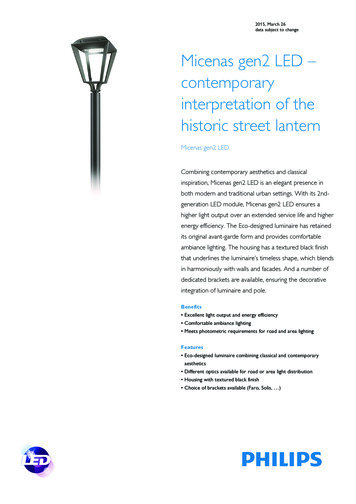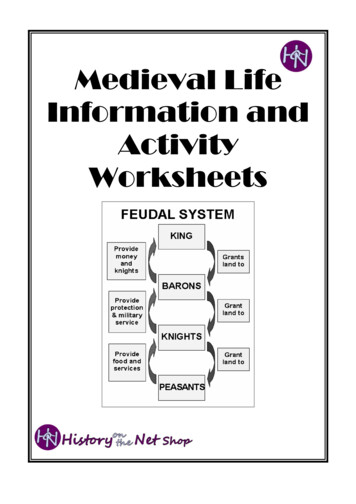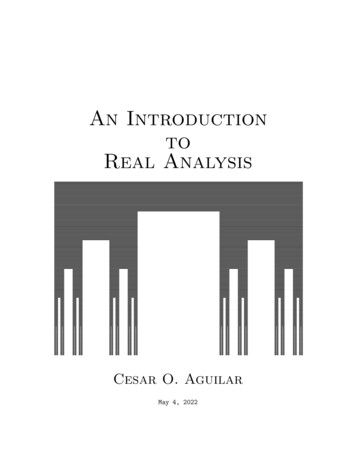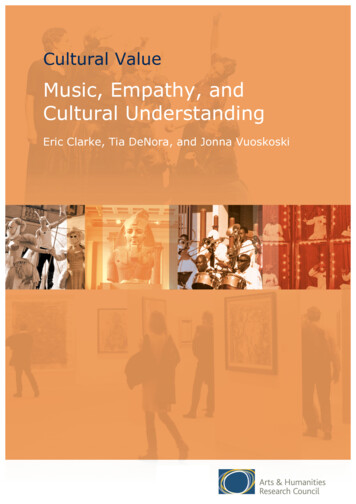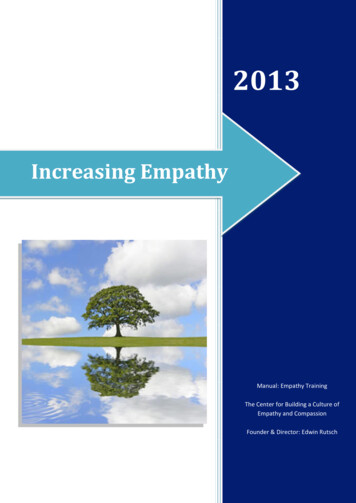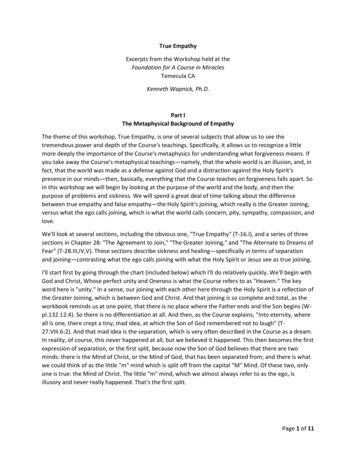
Transcription
True EmpathyExcerpts from the Workshop held at theFoundation for A Course in MiraclesTemecula CAKenneth Wapnick, Ph.D.Part IThe Metaphysical Background of EmpathyThe theme of this workshop, True Empathy, is one of several subjects that allow us to see thetremendous power and depth of the Course's teachings. Specifically, it allows us to recognize a littlemore deeply the importance of the Course's metaphysics for understanding what forgiveness means. Ifyou take away the Course's metaphysical teachings—namely, that the whole world is an illusion, and, infact, that the world was made as a defense against God and a distraction against the Holy Spirit'spresence in our minds—then, basically, everything that the Course teaches on forgiveness falls apart. Soin this workshop we will begin by looking at the purpose of the world and the body, and then thepurpose of problems and sickness. We will spend a great deal of time talking about the differencebetween true empathy and false empathy—the Holy Spirit's joining, which really is the Greater Joining,versus what the ego calls joining, which is what the world calls concern, pity, sympathy, compassion, andlove.We'll look at several sections, including the obvious one, "True Empathy" (T-16.I), and a series of threesections in Chapter 28: "The Agreement to Join," "The Greater Joining," and "The Alternate to Dreams ofFear" (T-28.III,IV,V). These sections describe sickness and healing—specifically in terms of separationand joining—contrasting what the ego calls joining with what the Holy Spirit or Jesus see as true joining.I'll start first by going through the chart (included below) which I'll do relatively quickly. We'll begin withGod and Christ, Whose perfect unity and Oneness is what the Course refers to as "Heaven." The keyword here is "unity." In a sense, our joining with each other here through the Holy Spirit is a reflection ofthe Greater Joining, which is between God and Christ. And that joining is so complete and total, as theworkbook reminds us at one point, that there is no place where the Father ends and the Son begins (WpI.132.12:4). So there is no differentiation at all. And then, as the Course explains, "Into eternity, whereall is one, there crept a tiny, mad idea, at which the Son of God remembered not to laugh" (T27.VIII.6:2). And that mad idea is the separation, which is very often described in the Course as a dream.In reality, of course, this never happened at all, but we believed it happened. This then becomes the firstexpression of separation, or the first split, because now the Son of God believes that there are twominds: there is the Mind of Christ, or the Mind of God, that has been separated from; and there is whatwe could think of as the little "m" mind which is split off from the capital "M" Mind. Of these two, onlyone is true: the Mind of Christ. The little "m" mind, which we almost always refer to as the ego, isillusory and never really happened. That's the first split.Page 1 of 11
What follows hard upon that is the second split, whereby the split mind now appears to be split as wellinto the part that constitutes the voice of the ego and the part that constitutes the Voice of the HolySpirit. And then there is the part of the split mind that we'll call the decision maker. That's the part ofthe Son of God's mind that has to choose between these two voices—the voice of the ego and the Voiceof the Holy Spirit. The voice of the ego speaks for the seeming reality of the dream, that the separationfrom God has truly happened. The Holy Spirit speaks for the unreality of the dream, which is what theCourse refers to as the principle of the Atonement, which says that the separation never trulyhappened. We could amplify that and say that the thought of being separate from God is nothing morethan a silly dream and not one to be taken seriously at all. The ego, on the other hand, takes all this veryseriously, because the ego is literally the thought of the dream, the thought of the separation. And thedecision maker, or the Son of God, now must choose between these two voices, which make twoantithetical statements.Page 2 of 11
Continuing with this as if it were a myth or a story, we see the ego now has a serious problem on itshands. The problem is that if the Son of God turns to the Holy Spirit and listens to His Voice and realizesthis is nothing but a dream—that the "tiny, mad idea" is simply that, a mad (meaning insane) idea thathas no effect at all—then the Son will waken from the dream and the ego will disappear, as the Courseexplains, back into the nothingness from which it came (M-13.1:2). So the ego now has to come up witha plan to convince the Son of God not to listen to the Holy Spirit but rather to listen to itself.The ego's plan basically is to tell the Son of God a story that has three parts to it, which we can denoteby the words "sin," "guilt," and "fear." The purpose of the story, as we'll see, is to convince him not tolisten to the Holy Spirit. And so the story begins with the ego telling the Son of God that he hascommitted a sin; he has done a terrible thing. He has taken the Love of his Father, the Love of hisCreator, and turned his back on it, saying to God, in effect, "What you have given me is not enough, andI want something more than everything." The ego tells the Son, "You have hurt your Father's feelings. Byseparating from your Source you have ruptured the unity of Heaven. Where there was only perfectOneness between God and His Son, now there is a division; there is now a split. Something terrible hashappened." And that terrible thing is what we call "sin."From sin comes the inevitable experience of guilt, whereby the ego tells the Son, "You should really feelguilty; you should really feel terrible because of what you've done, because you have stolen from yourCreator and your Source. What He had, you now have, and He no longer has it." In its most extremeform this is our belief that we have literally killed God. We have shattered Heaven, and so Heaven nolonger exists. What now exists is the ego and its thought system and, soon to be, as we'll see, its world.The ego continues its story, telling the Son, "What you have done to God was so awful and so terriblethat God is angry, and He is not going to take this stuff lying down. In fact, God wants to punish you andtake back from you what you stole from Him." The ego culminates its story by telling the Son of God:"The presence of love and light and Atonement in your mind that you call the Holy Spirit—don't believeit. Yes, indeed, that is God's Voice, but it is not a voice that speaks of love and dreaming. It's a voice thatspeaks of vengeance and wrath." This is the origin of all the "wrath of God" passages that we find in theBible, in both the Old and New Testaments. They have their birth, not in the consciousness of thewriters of these books, but in that original instant.Again, the belief is that the Holy Spirit now is no longer our friend; rather, He is the enemy. In effect, theego changes the Holy Spirit from the presence of the Love of God to the epitome of the wrath of God.The ego cautions the Son of God, saying, "If you take the Holy Spirit's hand, He will not lead you fromthe dream back to Heaven. He will lead you from the dream into an even worse dream, which will beGod's fury and God's wrath and God's vengeance; and you will be destroyed." The Son of God now has achoice to make between listening to the ego or the Holy Spirit. If he listens to the Holy Spirit, he trustsHim and believes in the reality of love, and that love cannot be rejected, abandoned, betrayed, or killed.If he listens to the voice of the ego, he believes just the opposite: that love can be abandoned, betrayedand killed, but love will have its vengeance. In an important theme which becomes central to the wholeCourse teaching, the ego tells the Son of God that love crucifies, love persecutes, love pursues, lovepunishes, and love, above all, kills.As we all know—because otherwise none of us would be here today—the Son of God makes the wrongchoice and, as the Bible says, listens to the lies of the serpent, which really are the lies of the ego, andbelieves what the ego has told him. The Son of God buys the ego's story, lock, stock, and barrel. And ofPage 3 of 11
course each of us in our seemingly fragmented or separated state is a segment or a fragment of thatoriginal Son of God. We began as one mind, and eventually that mind fragments over and over and overagain. As the Course explains at one point, the mind subdivides over and over (T-18.I.4:3), similar,actually, to what happens in what we call mitosis, or cell division, where organisms begin as one cell,become two cells and four cells and eight cells, etc., multiplying over and over again. That is areplication, or reflection, of what originally happened in the mind: that one thought of the ego, whichthe Son of God believes in and becomes, fragments over and over again. So each of us carries aroundwith us that original thought. We'll see in the course of the workshop how central this idea is forunderstanding why we do the kinds of things we do; why we feel sorry for people and feel compassionand concern for people.So the Son of God turns towards the ego; we turn our back on the Love of the Holy Spirit, because wenow believe the Holy Spirit is the enemy. We listen to the ego; and now that the ego has won us over, itcontinues its plan. The ego tells the Son of God, "We have a real problem on our hands, the problembeing this presence in the mind of the Holy Spirit, Who obviously will not go away. If we go near Him, Hewill drag us back to God, and we'll be destroyed. And so we have to do something about the wrath ofGod." What the ego has very cleverly done is to turn the Love of God into its opposite, into the wrath ofGod, which we are taught we should be afraid of. In truth, the ego is really afraid of God's Love, becausethere is no wrath or vengeance in God, and in the presence of God's Love the ego would disappear. Butthe ego doesn't tell us that. Instead it tells us God is not Love, God is vengeance and fury and hatred andinsanity, etc.And so we believe the ego, and then we have a problem. The problem is: What, now, do we do in orderto survive? To the ego, and to the Son of God who now identifies with the ego, the mind has become abattleground in which we believe that we are at war with God. In reality, of course, God doesn't evenknow about this. Everything below the first line at the top of the chart is outside His Mind, and thereforedoes not exist. But within the dream we do believe that God knows about the separation and is veryangry.We then in effect go to the ego and say: "Okay, I believed your story, but now what do I do? You know,this doesn't help me all that much because I still have this maniacal presence of vengeance in my mind.Help!" And the ego says, "I have a wonderful idea." The ego explains to the Son of God that there is noway we can defeat God or the Holy Spirit, because, after all, this is God, and we're outmatched totally onthis battleground. But we can leave the battleground, we can leave the mind, and we can hide. The egoexplains to the Son of God that when we leave the mind and hide, God will never find us. So we say:"That sounds like a great idea. When do we start?" And the ego says, "Well, there's no time like thepresent." So we do it immediately. Basically the ego is telling the Son of God how to defend himselfagainst God's wrath. And the ego's answer is to leave the mind. The psychological term that we give tothis dynamic of taking something within the mind and placing it outside the mind is "projection." And,therefore, when it is the thought of separation being projected from the mind, it gives rise to a world ofseparation. This becomes the ego's way of defending against the wrath of God.That's why the Course explains in one passage that the world—by which the Course means the entirephysical universe, not just this planet, not just the awful things in the world, but the entire physicaluniverse—was made as an attack on God (W-pI.3.2:1). And further down in the same paragraph: "Theworld was made to be a place where God could enter not" (2:4). Remember, that's the ego's plan: toPage 4 of 11
make a place where we can hide and God will never find us. If we remain in the mind, the ego tells us,the Holy Spirit will get us, and we will be destroyed. So the mind, then, becomes a very dangerous place.In effect, the ego takes its thought system, which is a thought system of sin, guilt, and fear, a thoughtsystem of separation, death, defense, and attack, and literally transfers it into the world, so that theworld becomes simply the reflection, or the out-picturing, of what is in the mind. It's an image that we'lluse in the course of the workshop: What we perceive on a movie screen when we sit in a movie theateris nothing more than the projection of the film that is running through the film projector. The filmprojector is representative of the mind, and the film running through the projector is the film of theego—the ego's story of sin, guilt, and fear.Therefore, what is running through the projector is exactly what we perceive on the screen. What weperceive on the screen is exactly, no more and no less than what is in the film. Everything we believe weperceive outside in the world, is nothing more than the out-picturing, or projection of what is within themind.The ego now takes steps to ensure that its plan will work. The very fact that this world seems to havegone on for billions of years and will probably go on for an even longer period of time, along with thefact that we all believe we are here and take our being in the body extremely seriously, are proof ofwhat a clever plan this is, and how cleverly the ego has protected it. And now we'll see exactly how theego has done this.First, once the world is made up, which means once the thought has been projected from the mind, theego causes a veil to fall across the mind so that we forget what we've done—we'll call that the veil ofdenial or forgetfulness. We now literally forget what we have made, which means we forget where theworld came from. We forget that the world is nothing more than a projection of what is in the mind, nomore real than the characters that we perceive on the movie screen. We all know, when we are notidentified with or really a part of the film that we're watching, that there are no live people on thescreen. We know that it's all make-believe; it's an illusion. It's all done with lights and shadows, etc.Similarly, this entire world is that way. However, once we forget where the world came from because ofthis veil of denial, the world now appears to be independent and external to the mind which made itand projected it out. So, as the Course explains in several passages, especially when it discusses guilt, webelieve that what we have projected out is outside (T-20.VIII.9:6; T-26.VII.4:9;12:2). But what isprojected never leaves the mind, as the Course explains in a very important principle: Ideas do not leavetheir source (T-26.VII.4:7; W-pI.132.5:3;156.1:3;167.3:6). The world is an idea, and it has never left itssource which is in the mind, just as Christ is an Idea in the Mind of God, and Christ has never left HisSource in the Mind. But, because of this veil, the world now appears as if it is separate from the mind.The crowning achievement of the ego thought system is that it makes a body. The body, which isregulated by the brain—we'll talk a little more later about the brain—now becomes what we believe weare. It is the body, which has been instructed, conditioned, trained and programmed by the mind, whichtells us there is indeed a world outside us. The reason we are so sure there is a world in which we feeland touch, and in which we study, a world into which we were born and which we will leave when wedie, the reason we believe all this is the body. The body is operated by a brain which gives messages toour sensory apparatus which brings back to the brain the messages the mind has asked for which speakof the world as being real. The brain then interprets it for us, and we believe that all this is exactly whatreality is. We'll look a little later at some passages which talk about this specifically. Again, keep in mindPage 5 of 11
always what the ego's fundamental purpose is—to escape from the Love of God. The Love of God is thereal threat. The Love of God can also be understood—and this will become important for the theme ofthis workshop—as analogous to that joining of God and Christ, because the Atonement says that theperfect Oneness of God and Christ has never been separated or divided.There is a wonderful passage in the text that refers to time as "a tiny tick" (T-26.V.3:5). It says that tick oftime was so tiny and insignificant that "not one note in Heaven's song was missed" (T-26.V.5:4).Everything that has seemed to happen since that tiny, mad idea has had no effect whatsoever onHeaven. Heaven doesn't even know about it. "Not one note in Heaven's song was missed." The perfectunity and Oneness of God and Christ has never been shattered. We have never left our Father's house.The "song of prayer" that the pamphlet speaks about, that the Father sings to the Son and the Son singsto the Father (S-1.In.1:2), has never been interrupted and has never changed. So we can put in the word"joining" here (see chart: Holy Spirit). The Holy Spirit, then, becomes the reminder, or the reflection, ofthe joining of God and Christ, the Father and the Son, that has never, never, ever stopped, that hasnever been severed or disturbed.The ego is the thought—put the word "separation" here (see chart: ego)—that the joining has indeedbeen disrupted, in fact, not only disrupted, it has been destroyed—and that the Father and the Son willbe forever separated and forever at odds with one another. Another way of understanding the originalseparation, which is the core of this thought system is that once the Son of God believed that he wasseparate from God, he perceived a difference. In other words, God and Christ were no longer a perfectunity; now there was the Father and the Son, and there was a difference between them.Now, in reality there is always a difference, because God is the Creator and the Source, and Christ, HisSon, is the created or the Effect. God is the First Cause and His Effect is the Son. However, in the state ofHeaven, Christ does not have a separated consciousness that can step back and experience Himself asseparate from the consciousness of His Creator. In other words, They are perfectly one. There is noplace where the Father ends and the Son begins, to repeat a passage quoted earlier (W-pI.132.12:4).There is no state of duality consciousness in Heaven. There is only the perfect oneness of God andChrist, and so there is no sense of being separate and therefore no consciousness that could observe adifference.It is only when the dream begins and the separation thought has begun to weave its magic and itspoison has infiltrated the mind, that the separation becomes real, which automatically leads to the ideathat there is a difference between God and His Son. God is the Creator, the Prime Creator, the FirstCause, the Source; and Christ, or the Son, is a second-class citizen, the Effect. That leads to the idea ofjudgment, because the Son looks at the difference, makes a judgment about it, and says, "What God hasis good, and what I have is bad. God is first and I am second, and that's not fair." These three termsreally are basically one and the same. I'm talking about them as if they were sequenced, but obviouslythey are all part of the same phenomenon. So the separation leads to the idea that there is a difference.The difference is immediately judged, and the Son now believes that he has been unfairly treated. "It'snot fair that God is the Authority, that God is the Cause, that God is in charge. I want to be in charge. Icould do a better job than God." This is the judgment which forms the core of the authority problem (T3.VI)—that's another workshop. But it's the idea that we're in competition with our Creator, which inthis world automatically leads to competition with our parents, our older siblings, our teachers, ourtherapists, our bosses, our friends, our spouses, our children, and on and on and on. It all comes fromPage 6 of 11
the judgment, "I could do it better; what God has done is not fair." And that justifies, from the ego'spoint of view, taking from God what the ego, or the separated Son, believes was always his. In otherwords, in the arrogance and insanity of the Son of God's mind, he believes that he began as top dog; hebegan as God. But God stole from him, and so now he is justified in stealing back from God. Thatjudgment automatically leads to the final idea, which is attack. We're talking here about the ego'sjudgments, not the Holy Spirit's judgment that everything is an expression of love or a call for it—that's atotally different idea. The ego always judges in terms of someone being better or worse than another.We'll see later on in the workshop that one of the most vicious ways the ego judges and attacks, underthe guise of being loving, involves the idea of sickness: Someone is sick and I am not; someone is introuble and I am not; someone is oppressed and I am not, and I'm going to do something about it. We'llsee that what the world calls love, concern, pity, and compassion is just the opposite. There is a line inthe text that says "What is not love is murder" (T-23.IV.1:10). The Course explains that none of what wecall caring and sympathy and concern is loving. And therefore it is a concealed desire to kill. We'll getback to this later. This is just a little of the coming attractions.So once we perceive separation we are seeing differences. Differences automatically lead to judgment,and judgment is always attack. The Son of God viewing God as different from him and having somethinghe doesn't have constitutes an attack. There is anger: "I have not been treated fairly." What thenautomatically follows is the behavior of attack. In our story, in the original myth, the Son now believeshe can steal from God what he feels justified in taking because it was originally his. Sin, then, is equatedultimately with attack. We can see, just by thinking briefly about it, that our entire world here becomesthe expression in form of separation, difference, judgment, and attack. Every single thing we do here isan expression of separation, difference, judgment, and attack. We'll see later on how sickness falls very,very nicely into that. In fact, that's why the ego made sickness.We're back to the culmination of the ego's plot, which basically is a plot or war against God, in which theego believes it can do an end-run around Him, because there's no way that it can defeat God and goright up the middle. Instead, the ego sneaks around so God hopefully will never find it, and makes up aworld projected outside the mind in which it can hide, because the Holy Spirit is in the mind, not in thebody and the world.The ego has persuaded the Son of God to identify with a thought system of sin, guilt, and fear thatculminates in sheer terror at the thought of confronting the Love of God, which leads the Son of Godvery quickly to become the ego. It's no longer that the Son of God has simply listened to the voice of theego. He now has identified totally with the voice of the ego, which means, for all intents and purposes,the Holy Spirit has been obliterated from his mind. As the Course explains, the Love of God can neverreally be obliterated from the mind, but it certainly can be hidden, and that's what this thought systemand the world do. That's why we speak of the world as "a hiding place." It becomes a distraction or asmokescreen, its purpose being to distract the Son of God's attention from where the problem is. Theego tells him the problem is in the mind, the problem being the Holy Spirit. What the ego, of course,never tells the Son of God is that the problem is not the Holy Spirit; the problem is with the decisionmaking part of his mind. The moment that he turns back towards the Holy Spirit the problem ends.Rather than have that happen, because if it happens the ego is finished, the ego again tells its story andpersuades the Son of God to distract himself. (That's what the arrow in the chart represents.). Hisattention now leaves his mind and goes into the world.Page 7 of 11
This is one way of understanding the line early in the text where Jesus says that "you are much tootolerant of mind wandering" (T-2.VI.4:6). Basically, in the ultimate sense, our attention has wanderedfrom the mind out into the world. Once that has happened, we forget where we came from. That's whythe veil of denial is so important; it causes us to forget where we came from. Now we actually believewe are a body with a brain. For all intents and purposes we have become mindless, which is the ego'sultimate purpose. In response, the ultimate purpose of the Course is to have us rediscover the power ofthe mind, because only within the mind can we find salvation. Salvation does not lie with the Holy Spirit;salvation does not lie with God. Salvation lies with the power of the mind to choose the Holy Spirit. Thepower of choice is the central teaching of the Course. The ego has taught us that we have no choice,that we have become the ego and there is no longer any alternative.That's the meaning of the section, "The Alternate to Dreams of Fear," that we'll look at later on in theworkshop. It says at one point, "God is the Alternate to dreams of fear" (T-28.V.1:6). The ego has told usthere is no alternate to the dream of fear. We are the dream of fear. The ego has then transferred thedream of fear from the mind to the body. Again, as I mentioned earlier in terms of the film and what wesee projected on the screen, what was in the mind which has now been split off becomes deposited inthe body. And so the thought system of sin, guilt, and fear—the thoughts of separation, difference,judgment, and attack—all have become part of the programming of the brain and the body in fact, ofthe whole world. So the world is an exact mirror of what is within the mind, except we have forgottenthat it is simply the reflection, and we've taken the reflection for the reality.You might say the Course is asking us to question the most basic experience that I am a subject and thatobjects outside me affect me through my sensory organs. The ego has been so skillful in this that someof the most brilliant brains throughout history have speculated and theorized, theologized,philosophized, and meditated on the body, the senses, the brain and the world, what we perceive andwhat we don't perceive, having no idea that none of this is real, that everything is a projection of themind. It's like a dog chasing its own tail it never ends anywhere, which is why nobody understandsanything. The world was made not to be understood. The only thing that's understandable about theworld is that there's no way it can be understood. The entire physical universe everything about thebody and the brain—was literally made up by the ego to distract us from the real problem, that wemade the wrong choice.The ego made up the sensory world and it made up a brain and a body which perceive and interpret thesensory world and react to it as if it were really there. Lesson 92 in the workbook makes this point veryclearly—we'll be going through this lesson in a little while, as it serves as an introduction to what we willbe covering in this workshop.The brain is what the ego tells us we really are. The brain is within the body, very much a part of thephysical world. The functioning of the brain is what most people today refer to as the mind. All this hasabsolutely nothing whatsoever to do with the mind itself. A good analogy is a puppeteer and thepuppets, with the puppeteer above the stage. Let's say that the puppets are marionettes, which meansthat they have strings, and the puppeteer is on top of the stage—he's not visible. He pulls the strings ofthese lifeless pieces of wood that have been painted and dressed up to be puppets. The puppets haveno life to them—they cannot see; they cannot hear; they cannot taste; they cannot feel; they cannotlive; they cannot die. But if the puppet show is a good one and the puppeteer is skillful, he can foolPage 8 of 11
people, especially young people—little children. But the puppeteer is not in the puppet; the puppet istotally separate from the mind.Another analogy is a computer, which is totally lifeless, totally dumb. It cannot think. But once thecomputer has been programmed by a programmer who writes a program and tells the computer how tothink, then the computer does all kinds of very impressive things. The programmer is not in thecomputer. The mind is not in the brain. The mind, as we'll see in just a minute, tells the body and thebrain what to do. And what does it tell the body and brain to do? It tells them to make the world real.Remember, the mind, or the decision maker, which has now become totally identified with the ego, tellsthe body to follow the ego's purpose, which is to have a world that will distract us and defend us againstGod. The ego convinces us that we are this body and this world is our home. It is the mind that hasprogrammed the body and the brain to believe that there is indeed a body and a brain, and that thereare other bodies outside itself. So the world is the reflection, or the out-picturing, of this thought systemthat the ego has told the Son of God is reality. We have sinned against God and we are guilty. We areterrified of God's wrath, and this terror can only be appeased by running away from it, by hiding andmaking up a world. In other words, we agreed with the ego and vowed and promised the ego that wewould never look at wha
So the Son of God turns towards the ego; we turn our back on the Love of the Holy Spirit, because we now believe the Holy Spirit is the enemy. We listen to the ego; and now that the ego has won us over, it continues its plan. The ego tells the Son of God, "We have a real problem on our hands, the problem
